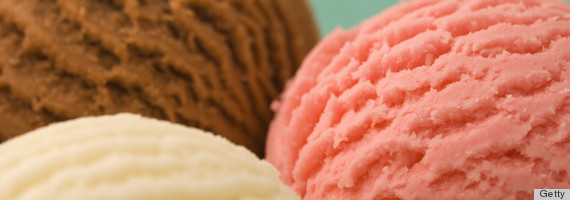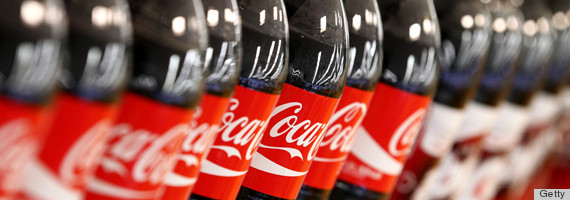In 2008 alone, Americans spent $35 billion on cosmetics and skincare. But are all these dollars wasted when we follow a diet that causes acne, premature aging and other skin conditions? It sure seems so.
"A typical American diet is full of foods and beverages that are bad for your skin," Julie Upton, MS, RD, a registered dietitian and co-founder of Appetite for Health, told us. With the help of Upton and Elizabeth M. Ward, MS, RD, we've narrowed down the worst dietary mistakes we're making when it comes to our skin.
1. Packing In Simple Sugars
![ice cream]()
"Nobody heads for a bag of carrots when they've had a bad day," Ward says. "They're going for the pint of premium ice cream in the freezer." But this choice might just make your bad day even worse if you take note of what's happening to your skin. Foods with added sugars spike your blood sugar and cause chronic inflammation in the body, which damages your collagen and elastin in a process known as glycation. The digested sugar permanently attaches to the collagen in your skin, and it happens each time you eat sugary foods like candy, ice cream, condiments and processed foods. Skin conditions like acne and rosacea can be exacerbated by glycation.
"This whole process is metabolically very damaging," Upton says, and she recommends satisfying your sweet tooth with antioxidant-rich natural sugars, like those found in fruits, to neutralize the inflammation caused by sugar and insulin spikes.
2. Eating Too Many Starchy, High-Glycemic Foods
![pasta]()
"High-glycemic index diets are linked to premature aging of the skin," says Upton. Starches like white bread, pasta and white rice cause rapid spikes in blood sugar, which leads to inflammation in the body. This process produces enzymes that break down collagen and elastin, giving you sagging skin and wrinkles. What's more, studies have shown that swapping high-glycemic foods for their low-glycemic counterparts, like whole grains and beans, can improve acne, suggesting that high-glycemic foods actually spark breakouts. So the next time you're craving a piece of bread, you may want to think about opting for whole grains, which are low-glycemic, anti-inflammatory and rich in antioxidants.
3. Forgetting To Count Beverages
![soda]()
"The number one source of added sugars in the US diet is beverages," says Upton. Just like in food, sugar found in liquids can contribute to premature aging, acne and other inflammatory skin conditions, especially since sugar in beverages like juice and soda are absorbed into the bloodstream very quickly. Sodas might just be the biggest culprit, since many dark colas contain advanced glycation end products (AGEs), which give them their dark color and have been shown to speed up the process of skin aging.
Excessive amounts of alcohol also wreak havoc on your skin, since alcoholic beverages dehydrate your skin and therefore accelerate aging. Water in your cells is what keeps skin plump and dewy and reduces the look of lines and wrinkles. "If you're not drinking enough water during the day on a regular basis and then you're having a couple of glasses of wine every night, you're really hitting your skin up twice there," says Ward. Some people also get very flushed from drinking alcohol with sulfites, she adds. If you're concerned about the effects of dehydration on the skin, you may also want to avoid caffeinated beverages, which constrict your blood vessels, reduce circulation and cause dehydration.
The bottom line: Both Ward and Upton recommend drinking plenty of water and eating a diet rich in fiber, protein and healthy fats, like those found in fish, to fend off aging and inflammatory skin conditions. And while the results of eating well may not manifest as quickly as a chemical peel or Botox, don't underestimate the power of nutrition. "A lot of beauty is how you feel about yourself," Upton says. "You don't exude confidence when you eat candy and soda all day. You just don't. "
Get into the groove:
Want more? Be sure to check out HuffPost Style on Twitter, Facebook, Tumblr, Pinterest and Instagram at @HuffPostStyle.
"A typical American diet is full of foods and beverages that are bad for your skin," Julie Upton, MS, RD, a registered dietitian and co-founder of Appetite for Health, told us. With the help of Upton and Elizabeth M. Ward, MS, RD, we've narrowed down the worst dietary mistakes we're making when it comes to our skin.
1. Packing In Simple Sugars

"Nobody heads for a bag of carrots when they've had a bad day," Ward says. "They're going for the pint of premium ice cream in the freezer." But this choice might just make your bad day even worse if you take note of what's happening to your skin. Foods with added sugars spike your blood sugar and cause chronic inflammation in the body, which damages your collagen and elastin in a process known as glycation. The digested sugar permanently attaches to the collagen in your skin, and it happens each time you eat sugary foods like candy, ice cream, condiments and processed foods. Skin conditions like acne and rosacea can be exacerbated by glycation.
"This whole process is metabolically very damaging," Upton says, and she recommends satisfying your sweet tooth with antioxidant-rich natural sugars, like those found in fruits, to neutralize the inflammation caused by sugar and insulin spikes.
2. Eating Too Many Starchy, High-Glycemic Foods

"High-glycemic index diets are linked to premature aging of the skin," says Upton. Starches like white bread, pasta and white rice cause rapid spikes in blood sugar, which leads to inflammation in the body. This process produces enzymes that break down collagen and elastin, giving you sagging skin and wrinkles. What's more, studies have shown that swapping high-glycemic foods for their low-glycemic counterparts, like whole grains and beans, can improve acne, suggesting that high-glycemic foods actually spark breakouts. So the next time you're craving a piece of bread, you may want to think about opting for whole grains, which are low-glycemic, anti-inflammatory and rich in antioxidants.
3. Forgetting To Count Beverages

"The number one source of added sugars in the US diet is beverages," says Upton. Just like in food, sugar found in liquids can contribute to premature aging, acne and other inflammatory skin conditions, especially since sugar in beverages like juice and soda are absorbed into the bloodstream very quickly. Sodas might just be the biggest culprit, since many dark colas contain advanced glycation end products (AGEs), which give them their dark color and have been shown to speed up the process of skin aging.
Excessive amounts of alcohol also wreak havoc on your skin, since alcoholic beverages dehydrate your skin and therefore accelerate aging. Water in your cells is what keeps skin plump and dewy and reduces the look of lines and wrinkles. "If you're not drinking enough water during the day on a regular basis and then you're having a couple of glasses of wine every night, you're really hitting your skin up twice there," says Ward. Some people also get very flushed from drinking alcohol with sulfites, she adds. If you're concerned about the effects of dehydration on the skin, you may also want to avoid caffeinated beverages, which constrict your blood vessels, reduce circulation and cause dehydration.
The bottom line: Both Ward and Upton recommend drinking plenty of water and eating a diet rich in fiber, protein and healthy fats, like those found in fish, to fend off aging and inflammatory skin conditions. And while the results of eating well may not manifest as quickly as a chemical peel or Botox, don't underestimate the power of nutrition. "A lot of beauty is how you feel about yourself," Upton says. "You don't exude confidence when you eat candy and soda all day. You just don't. "
Get into the groove:
Want more? Be sure to check out HuffPost Style on Twitter, Facebook, Tumblr, Pinterest and Instagram at @HuffPostStyle.